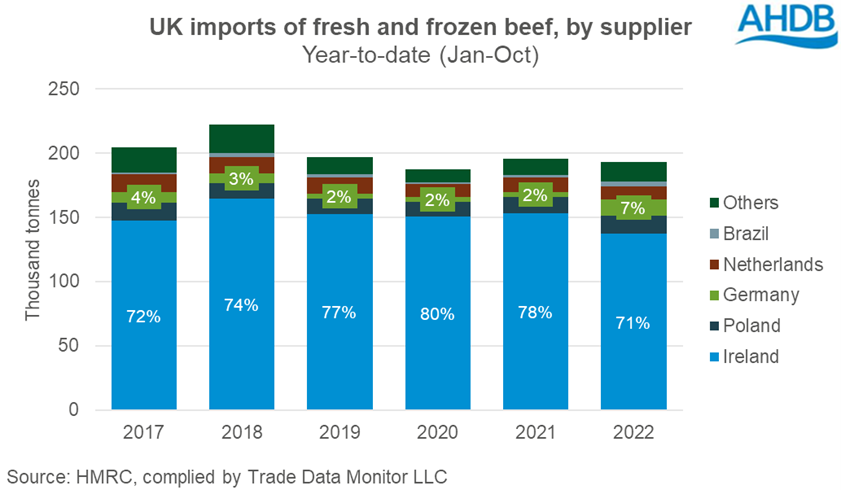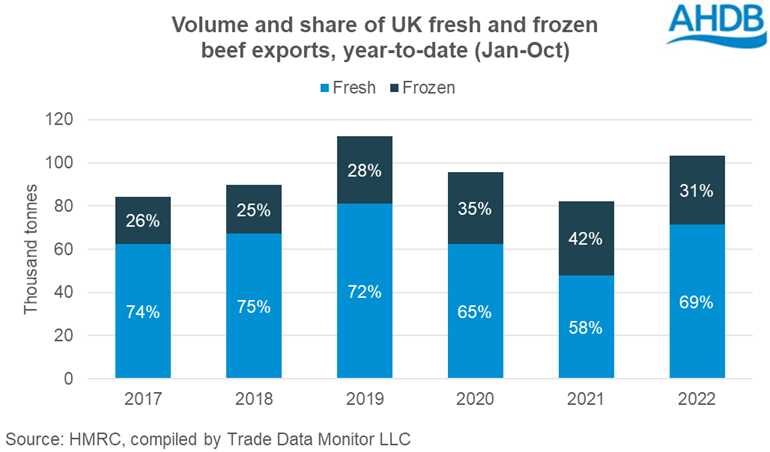October UK beef trade review
Thursday, 22 December 2022
Imports
During October, the UK imported 21,100 tonnes of fresh and frozen beef, up 14% compared to September volumes, but 9% lower versus October a year ago. This is according to the latest data from HMRC.
The majority of the month-on-month uplift came in fresh product, predominantly from Ireland. Fresh Irish beef imports totalled 12,500 tonnes, up nearly 3,000 tonnes (29%) on the month.
Total frozen beef import volumes fell slightly in October compared to September. Frozen imports from Ireland stayed relatively stable at 4,300 tonnes. However, shipments halved from Germany to 600 tonnes, while other EU suppliers including Poland also sent less.
The October figures meant that total UK fresh and frozen beef imports for the year-to-date (Jan-Oct) stood at 193,000 tonnes, down just 1% compared to the same period a year ago.
There have been some changes among suppliers during this time. Shipments from Germany have increased three-fold, from 4,000 tonnes in 2021 to nearly 13,000 tonnes in 2022 (Jan-Oct). This put the country as third largest supplier to the UK, overtaking the Netherlands. The growth in German shipments has been driven by frozen beef, particularly boneless product.
Meanwhile, imports from the UK’s key supplier, Ireland, have fallen by around 10% (-16,000 tonnes). However, Irish product still accounted for 71% of UK fresh and frozen beef imports in the first ten months of 2022.
UK imports of Irish beef typically comprise 70% fresh and 30% frozen by quantity, which has remained the case in 2022. Most of the annual decline in Irish product has been in fresh beef (particularly boneless, the top category within fresh beef), but frozen imports have also declined (-1,600 tonnes).

Exports
Looking at beef leaving the country, exports of fresh and frozen product totalled 10,100 tonnes in October, up 7% (+705 tonnes) from September, but flat (-0.1%) compared to October 2021. Exports to the EU rose by 10% (800 tonnes) year-on-year, but this was outweighed by declines in shipments to Iran, the US, the Philippines, and Ireland.
For the year-to-date (Jan-Oct), UK fresh and frozen beef exports totalled 103,000 tonnes, up 26% versus the same period a year ago. Fresh beef shipments have grown strongly in 2022 so far (+50%; +24,000 tonnes) and have been the driver of overall export growth. Fresh beef exports have grown particularly to France, the Netherlands and Ireland.

Meanwhile, frozen beef exports have shown annual decline, by 7% to total 32,000 tonnes. Although shipments have grown strongly to the EU, this was outweighed by losses to markets further afield, namely Hong Kong and the Philippines.
In value terms, total fresh and frozen exports for the year-to-date equated to £559.6 million, up 56% year-on-year.

Sign up for regular updates
You can subscribe to receive Beef and Lamb market news straight to your inbox. Simply fill in your contact details on our online form.
While AHDB seeks to ensure that the information contained on this webpage is accurate at the time of publication, no warranty is given in respect of the information and data provided. You are responsible for how you use the information. To the maximum extent permitted by law, AHDB accepts no liability for loss, damage or injury howsoever caused or suffered (including that caused by negligence) directly or indirectly in relation to the information or data provided in this publication.
All intellectual property rights in the information and data on this webpage belong to or are licensed by AHDB. You are authorised to use such information for your internal business purposes only and you must not provide this information to any other third parties, including further publication of the information, or for commercial gain in any way whatsoever without the prior written permission of AHDB for each third party disclosure, publication or commercial arrangement. For more information, please see our Terms of Use and Privacy Notice or contact the Director of Corporate Affairs at info@ahdb.org.uk © Agriculture and Horticulture Development Board. All rights reserved.

